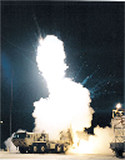|
 A
Turkish military delegation is expected to leave for Israel later this
month or in early April to discuss the possibility of Turkish
involvement in the U.S.-Israeli Arrow 2 anti-tactical ballistic missile
(ATBM) system. Despite press reports that the United States has given
the green light for Turkish participation in the further production of
Arrow missiles, as of yet there has been no official sign from
Washington that it has agreed to this. A
Turkish military delegation is expected to leave for Israel later this
month or in early April to discuss the possibility of Turkish
involvement in the U.S.-Israeli Arrow 2 anti-tactical ballistic missile
(ATBM) system. Despite press reports that the United States has given
the green light for Turkish participation in the further production of
Arrow missiles, as of yet there has been no official sign from
Washington that it has agreed to this.
One Israeli source close to the issue speaking
with the Turkish Daily News confirmed that there has been no official
go-ahead for Turkey's participation in the program but also said that
discussions between Turkey and Israel are continuing on the issue.
During its visit to Israel, the Turkish delegation plans to work out
with Israel, among other things, details concerning what kind of
technology and production share that Turkey would assume in the program.
The Arrow program, five years behind schedule and
with a price tag of $2 billion, is being 60 percent funded by the United
States. Thus any country interested in the program needs to get approval
from both the United States and Israel for its sale as well as a
technology cooperation agreement for joint production. As reported by
Jane's Defence Weekly in its latest issue, Israel became the only
pro-Western country with an operational anti-missile defense system
after it declared the first Arrow 2 battery operational two weeks ago.
The Israel Aircraft Industries (IAI) Arrow system
is the first of three that will be deployed around Israel to protect it
against missile threats, said the magazine. One Turkish source added
that after an agreement is reached on what kind of technology Israel
could agree to transfer to Turkey on Arrow production, the second stage,
which requires a U.S. approval process, could then begin.
The U.S. sources recalled that there are three
steps required for Israel to get permission for third-country sale of
the missiles. According to the procedure, Israel's IAI should first
establish a marketing partnership for the Arrow with a U.S. company, and
secondly IAI's partner should obtain a marketing license for the Arrows
from the U.S. State Department. Once IAI's U.S. partner obtains that
license, it has to apply for permission for the third-country Arrow
sale. IAI is currently been negotiating with the three leading U.S.
companies, namely Boeing, Lockheed Martin and Raytheon, to establish a
marketing partnership for the Arrow. As reported by Jane's, Israel wants
to reduce the cost of deployment and further development by selling the
anti-missile system to other countries. Many countries have expressed
interest, including the United Kingdom, Turkey, Japan and India.
Turkey has been on a quest to acquire
anti-ballistic missile systems to establish an effective deterrence
against the ballistic missile threats that its immediate eastern and
southeastern neighbors pose. A Turkish source said that Turkish military
prefers the Arrow to the PAC3 (the latest version of Patriot missiles)
since the Arrow has more advanced technology. Rather than simply buying
Arrow systems, Turkey wants to take part in their co-production in order
to establish an certain infrastructure on anti-ballistic missile
technology.
If the United States granted Turkey permission to
obtain the Arrow 2 system, Ankara would be willing to buy up to 30
batteries of the system. Establishing even a very limited Arrow missile
shield in Turkey will cost Ankara at least $5 billion. Also, Turkey's
desire for technology aid does not appear satisfied by the financial
help the United States extended in establishing a simulation center at
Middle East Technical University (METU/ODTU). Instead, Ankara now wants
Washington to be more cooperative in transferring Arrow missile
technology to Turkey. A Turkish delegation was in the United States in
late January this year to take part in a simulated-theater missile
defense exercise under the auspices of the U.S.-Turkish bilateral
working group on theater missile defense.
The planned ODTU simulation center involves
war-fighting laboratory exercises of various theater missile defense
scenarios. (Turkish Daily News, Lale Sariibrahimoglu)

Click to return the Journal of TdN Monitor
March 2000 News Headlines
[ Back ] [ Next ] |